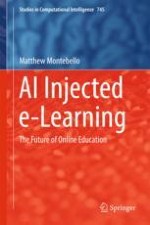This chapter brings all the previous chapters together as they collectively and incrementally built up a crescendo to reach the highlight, namely injecting e-learning
with AI to customise
the education
process. The proposed model
makes us of all the techniques
discussed in the previous chapters and endeavours to compatibly bring them together to create an intelligent
personal learning environment
. The evolution of e-learning was led imposed by the technology but this model
proposes to conveniently employ numerous technologies and techniques
to directly address specific e-learning
issues. The next generation of
online education is not dictated by technology but by the academic need to personalise learning together with the efficient automation
offered by AI. The first e-learning issue addressed is that of isolation and Chap.
3 undertook this task with the ingenuity of crowdsourcing
and the popularity of social networks. The connectivism learning theory
has been associated with this phenomenon and this model
makes good use of this first factor. Motivation
is another e-learning issue that is addressed through the contributions from Chap.
4 as learner
profiling
and learning portfolios support student
to be much more self-determined in their academic endeavour. The third and final issue tackles the issue of impersonality
that e-learning is notoriously criticised, and Chap.
5 offers adaptive environments through the combination of a learning portfolio and supportive learning network. A truly intelligent personal learning environment
backed and injected by AI techniques
is being proposed as a compatible combination of all these technologies to enhance e-learning
effectiveness as it leads online
education to its future and the next e-learning generation
. The rest of this chapter is organised as follows. The section that follows expands further the underlying rationale that led to the proposed model
by analysing the contributions from the previous chapters. This is followed by the architectural setup of how these technologies come together within an online
system
to deliver a functional and intelligent PLE. The next section tackles all the implementation details that take place to accomplish and complete the architectural design presented before. Finally operational and pragmatic details of how the
online PLE functions are covered in an effort to show how the
AI-injected e-learning system will operate in reality.
